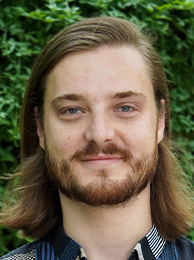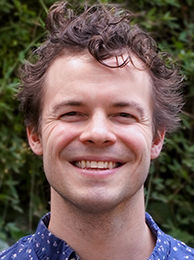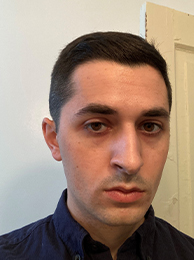2023 Hack Graduate Award recipients take on water issues from evolutionary and ecological adaptation and drought to new technologies for sustainable water treatment
The High Meadows Environmental Institute (HMEI) has selected 12 Princeton University graduate students as 2023 recipients of the Mary and Randall Hack ’69 Graduate Awards for Water and the Environment. The awardees include Rachael Clifford, Theo Gibbs, Finote Gijsman, Christian Gray, Dina Kussainova, Bing Lin, Camila Llerena-Olivera, Yeraldi Loera, Jinhee Park, Darius Sadighi, Melissa Tier, and Shaharyar Wani. They represent the departments of anthropology, ecology and evolutionary biology, English, chemical and biological engineering, civil and environmental engineering, and mechanical and aerospace engineering, as well as the Program in Quantitative and Computational Biology and the School of Public and International Affairs.
Their research addresses a broad range of topics with a shared focus on water and the environment and include such investigations as the portrayal of water in nineteenth and twentieth century Caribbean literature; the use of bacteria to remove nitrogen and PFAS from wastewater; how dung beetles in African savannahs are impacted by interactions between drought and the loss of large mammals; humanitarian responses to climate change in the Mekong delta; how multiple species of duckweed interact within waterways; the effectiveness of initiatives to prevent harmful contacts between recreational scuba divers and coral reefs; and how crocodiles in Belize are evolving in response to chronic pesticide exposure.
The Mary and Randall Hack ’69 Graduate Award for Water and the Environment provides research funding to Princeton University graduate students pursuing innovative research on water and water-related topics with implications for the environment, including projects related to climate science, engineering, and environmental policy.
Brief descriptions of each recipient’s research proposal are below.
Rachael Clifford, English


Advisers: William Gleason, the Hughes-Rogers Professor of English and American Studies; Rob Nixon, the Thomas A. and Currie C. Barron Family Professor in Humanities and the Environment and Professor of English and the High Meadows Environmental Institute; Simon Gikandi, the Class of 1943 University Professor of English and Department Chair, English
Clifford will explore the poetics of water in the coming-of-age narratives of four Caribbean writers from the nineteenth and twentieth centuries: Jamaica Kincaid, Mary Prince, Edwidge Danticat, and George Lamming. This project, which builds upon her dissertation’s focus on the poetics of nature more broadly, aims to situate the individual experiences and imaginations of these writers and their characters against the broader backdrop of slavery and colonialism. Clifford will visit archives at the British Library, Harvard University, the University of the West Indies, and the University of Florida in order to access writing and historical papers related to the authors, and to directly experience the places at the heart of these writers’ lives and works. From this research, Clifford will create a series of public-facing essays exploring how the poetics of water Caribbean coming-of-age literature was shaped in response to slavery, colonialism, and ecological crisis.
Theo Gibbs, Quantitative and Computational Biology


Advisers: Jonathan Levine, the J.N. Allison Professor of Environmental; Simon Levin, the James S. McDonnell Distinguished University Professor in Ecology and Evolutionary Biology.
Gibbs will study interactions between five species of Lemnoideae, a family of floating aquatic plants also known as duckweed. Duckweed commonly live in multispecies assemblages in waterbodies across the northeastern United States, but the mechanisms enabling their coexistence are unknown. Species coexistence in general is an enigma in community ecology and one of the central challenges in the field is understanding whether coexistence is generated because of higher-order interaction — that is, interactions involving three or more species. Gibbs will investigate whether higher-order interactions impact duckweed growth by comparing the growth rates of each of five focal species when they are growing alongside competitor species. Duckweed is interesting from an environmental perspective as a promising biofuel, a significant potential food source, as it stores more protein per unit area than soybeans, and as a possible method for purifying wastewater and contaminated lakes. These applications may be impacted by and optimized through an improved understanding of duckweed ecology.
Finote Gijsman, Ecology and Evolutionary Biology


Adviser: Robert Pringle, Professor of Ecology and Evolutionary Biology
Gijsman will experimentally test how dung beetle communities are impacted by interactions between drought and the loss of large mammalian herbivores in an African savanna. Dung beetles contribute to a wide range of ecosystem services through the breakdown and distribution of dung, and if they were to decline or go extinct, it would have profound implications for ecosystem functionality. However, little is known about how declines in mammal species might impact dung beetle diversity and the ecosystem services that they provide. Gijsman will conduct her research at the Mpala Research Centre in Kenya, a region that has been experiencing one of the worst droughts in recent history, with more than four consecutive seasons of failed or below-average rains that have killed thousands of large mammalian herbivores. This research will contribute to our understanding of how rainfall and megafaunal declines interact to structure dung beetle communities in African savannas, which will be crucial for their conservation.
Christian Gray, Ecology and Evolutionary Biology


Adviser: Lars Hedin, the George M. Moffett Professor of Biology and Professor of Ecology and Evolutionary Biology and the High Meadows Environmental Institute
Gray will explore the role of water in shaping the Fynbos, a vibrant shrubland in the Western Cape of South Africa that hosts an astonishing diversity of unusual plants found nowhere else in the world. One of the key factors influencing this unique biome is water. The Fynbos is a highly seasonal ecosystem that is shaped by fluctuating water availability, nutrient stress, and fire, and climate change is expected to amplify the role of water in the coming decades, as the Western Cape is predicted to experience some of the most rapid rates of change in rainfall and climate conditions. Gray will explore the role of precipitation and soil moisture in determining plant belowground strategies — what type of roots they grow, and whether they choose to form associations with nitrogen-fixing mycorrhizal fungi. Gray also aims to clarify how soil moisture and nutrient availability interact to shape belowground strategies, as soil moisture significantly affects the biogeochemical cycling of essential soil nutrients such as nitrogen and phosphorous. Gray will juxtapose the belowground strategies of plants from the Fynbos with plants growing in neighboring patches Afrotemperate Forest, a biome that has a well-developed water cycle despite growing on the same geological substrate and under an identical climate regime.
Dina Kussainova, Chemical and Biological Engineering


Adviser: Athanassios Panagiotopoulos, the Susan Dod Brown Professor of Chemical and Biological Engineering
Kussainova will use machine learning techniques to study the thermodynamic and transport properties of aqueous electrolyte solutions consisting of alkali halides in water. Aqueous electrolyte solutions are important for many environmental, industrial, and biological applications like geological carbon sequestration, and for wastewater treatment, separation, and purification. Current computational approaches for exploring the properties of these solutions — such as their solubility and thermodynamic activity — are computationally challenging, prohibitively expensive, and limited in their ability to accurately predict how these properties vary with temperature and concentration. Kussainova plans to develop machine-learning models based on quantum-mechanical calculations to accurately simulate these systems under different conditions. Then, she will use these models to predict the solubility and activity coefficients of various alkali halides in water using free energy calculations.
Bing Lin, School of Public and International Affairs


Adviser: David Wilcove, Professor of Ecology and Evolutionary Biology, the High Meadows Environmental Institute, and Public Affairs
Lin will investigate the behavior of recreational scuba divers in Southeast Asia. Coral reefs are of outsized ecological importance and provide ecosystem services to millions of people around the world, but they are also on a sweeping global decline. Tourist activities such as snorkeling and scuba diving have direct and indirect impacts on coral reefs and other coastal ecosystems. One impact of diving is the occurrence of harmful physical contacts between divers or their diving equipment and benthic marine life, which can directly harm reef organisms. Several initiatives aim to reduce reef contacts in divers across the world, for example through programs that certify dive operators to voluntarily adhere to certain environmental standards. The largest of these programs, Green Fins, was initiated by the United Nations Environmental Program to mitigate unsustainable underwater behaviors such as physical reef contacts in divers and snorkelers. However, there has been no formal evaluation of whether Green Fins certified operators and their customers have fewer and less severe reef contacts compared to non-certified operators. Lin aims to perform such a comparison by collecting camera footage and surveys from tourists diving with Green Fins–certified vs non-certified diver shops in the Philippines, Indonesia, and Malaysia. Lin plans to use this data to understand the factors that play a role in determining the frequency, timing, and severity of physical contacts. This information will ultimately be useful in improving sustainable reef tourism.
Camila Llerena-Olivera, Civil and Environmental Engineering


Adviser: Peter Jaffé, the William L. Knapp ’47 Professor of Civil Engineering and Professor of Civil and Environmental Engineering
Llerena-Olivera will explore and optimize a method for using microbes for wastewater treatment. The runoff of excess nitrogen from fertilizer is a major challenge in the wastewater industry. This nitrogen, which is often in the form of ammonium, depletes oxygen from aquatic environments, thus making them more susceptible to harmful algal blooms. One method of removing ammonium from wastewater is to use “annamox” bacteria. Llerena-Olivara will test the use of annamox bacteria in microbial electrolysis cells (MECs), an emerging, low-cost wastewater treatment technology that uses bacteria and electrochemical currents to clean wastewater. Llerena-Olivera has already shown that using carbon brush anodes can improve annamox bacteria’s performance within MECs. Now, she plans to further explore the performance of carbon brush anodes under different environmental conditions, for example by adding sources of carbon, varying the pH and voltage, and in the presence of different concentrations of ammonium.
Yeraldi Loera, Ecology and Evolutionary Biology


Adviser: Shane Campbell-Staton, Assistant Professor of Ecology and Evolutionary Biology
Loera will explore evolutionary responses to pesticide exposure in Morelet’s crocodiles. Chronic exposure to pesticides and other toxic chemicals can act as a source of human-mediated evolutionary selection. Uncovering the mechanisms by which this selection confers adaptive resistance can help us understand and predict the long-term evolutionary consequences of this exposure. Today, global pesticide use exceeds 2 million tons annually. Excessive pesticide use in agriculture has led to significant contamination in the most biodiverse natural areas in the world, including the natural water systems of Belize. These waterways are home to Morelet’s crocodiles, generalist apex predators that are uniquely suited for studies on persistent pesticide bioaccumulation due to their longevity, which allows individuals to be repeatedly tested through time, and because of the biomagnification of contaminants across trophic levels of the food chain. Loera will use this system, to build upon the mechanistic understanding of physiological responses to DDT pesticide exposure and to describe the genomic and transcriptomic signatures of selection for adaptive resistance in chronically exposed populations.
Jinhee Park, Civil and Environmental Engineering


Advisers: Peter Jaffé, the William L. Knapp ’47 Professor of Civil Engineering and Professor of Civil and Environmental Engineering; Bruce Koel, Professor of Chemical and Biological Engineering
Park will explore methods for using bacteria to degrade PFAS or “forever chemicals,” a group of highly persistent and toxic chemicals found in numerous consumer products and environmental systems. Methods to degrade PFAS are severely limited, but Park and other members of the Jaffé lab have previously shown that a type of bacteria that lives in iron-rich soils, Acidimicrobium sp. strain A6, can defluorinate PFAS. One challenge of using this method in the field would be to supply iron oxides that the bacteria need to undergo the reaction. Park will use X-Ray absorption spectroscopy techniques to explore the possibility of coating iron oxides with PAA, a non-toxic polymer, to enhance their transport, delivery, and ability to degrade PFAS. Ultimately, this research aims to protect human and environmental health from the harmful effects of PFAS contamination.
Darius Sadighi, Anthropology


Advisers: João Biehl, the Susan Dod Brown Professor of Anthropology and Department Chair, Anthropology; Jerry Zee, Assistant Professor of Anthropology and the High Meadows Environmental Institute
Sadighi will undertake an ethnographic project in Can Tho, the largest city in southern Vietnam’s Mekong Delta region, to explore “nature based” humanitarian interventions in the face of climate change. The Mekong Delta is facing a slew of climate change-related and anthropogenic environmental issues, such as flooding, agricultural and aquacultural disruption, biodiversity loss, and rising sea levels. These issues are taking place on top of historical environmental damage done during the Vietnam War, when the U.S. military sprayed over 12 million gallons of the defoliant Agent Orange into the delta. Sadighi will work alongside farmers affected by the climate crisis, scientists studying the effects of climate change on the delta’s ecosystem, and conservation and development nonprofits to explore how climate change is forcing humanitarian organizations to reconceptualize the relationship between humans and environments, and how adaptations to climate change in Vietnam are related to the adaptation to war-torn environments.
Melissa Tier, School of Public and International Affairs


Advisers: Elke Weber, the Gerhard R. Andlinger Professor in Energy and the Environment and Professor of Psychology & Public Affairs; Michael Oppenheimer, the Albert G. Milbank Professor of Geosciences and International Affairs and the High Meadows Environmental Institute
Tier will investigate preferences for climate-resilient housing policies across four distinct urban locations — New York City, San Juan, Seoul, & Vienna. By surveying residents and policymakers in each location, Tier will explore how “equity” is conceptualized between different interest groups and regions, and whether increasing the equity features of climate-resilient housing policies increases or decreases overall support for those policies. Tier will use a combination of quantitative and qualitative methods to assess whether there are any clear equity-related trends when comparing climate-resilient housing policy preferences among residents vs. policymakers in the studied locations.
Shaharyar Wani, Mechanical & Aerospace Engineering


Adviser: Craig Arnold, the Susan Dod Brown Professor of Mechanical and Aerospace Engineering
Wani will explore the function of a new carbon aerogel material for removing PFAS, also called “forever chemicals”, from water. PFAS are an ever-growing environmental concern because they readily contaminate water bodies and are difficult to remove or degrade. Current methods of water filtration include reverse osmosis, which is expensive and unsustainable, and carbon-based filters, which are economical but show limited efficacy in removing PFAS. Water filters based on nano-structured carbons such as graphene aerogels show more promise but are difficult and unsustainable to produce. Wani and other members of the Arnold lab have recently developed a new type of carbon aerogel material by processing readily available proteins such as egg-whites. Wani will explore and optimize this new material’s characteristics to develop a prototype for a carbon aerogel water filter. Wani will investigate the material’s optimal properties by tuning factors such as pore size and surface area and will explore the possibility of enhancing the aerogel’s ability to capture PFAS and other contaminants by incorporating copper or iron nanoparticles into the aerogel material.




